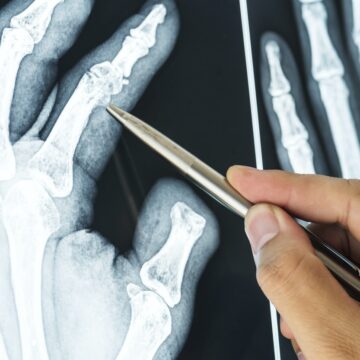
- Osteoporosis occurs when bones lose density and strength over the years, resulting in higher risks of fracture.
- It commonly occurs in older women especially during menopause where loss of estrogen heightens bone loss.
- Healthy lifestyle habits, exercise and medications can greatly prevent bone loss and risk of breaks in the future.
Osteoporosis is a bone disease where bones gradually thin out and lose their strength to the point that they break easily. In the U.S., an estimated 54 million Americans have osteoporosis and 50 percent of women age 50 or older are at risk of breaking a bone caused by osteoporosis.
The disease can strike at any age. Typically, women may quickly lose more bone density than men during menopause. The loss of estrogen for several years also elevates risks for osteoporosis.
Good thing, you can still take action to prevent osteoporosis later in life. The sooner you start keeping your bones strong and healthy, the less likely you will break bones when you are in your 50s and beyond.
Here are some bone health-supporting tips shared by Dr. Kendall F. Moseley, endocrinologist and osteoporosis specialist at the Johns Hopkins Metabolic Bone Center.
1. Strengthen Your Bones Through Your Diet

Get Enough Calcium
For lifelong bone health, you need a certain amount of calcium every day. Your recommended daily calcium intake should be:
- 1,000 mg for women 50 and younger
- 1,200 mg for women 51 and older
You can get the most of your calcium from a well-balanced diet first before adding calcium supplements. To estimate your daily intake, read and understand food labels. Keep in mind that these labels are based on a daily allowance of 1000 mg. So if your food label lists calcium content as 25%, drop the % and replace it with a zero, meaning you’re getting 250 mg of calcium per serving
Take Vitamin D As Well
The best sources of Vitamin D are sunlight and diet. Vitamin D helps your body absorb calcium and use it to keep your bones strong. Your body naturally makes the nutrient when the sun shines directly on your skin. But most people can’t solely depend on the sun for their daily dosages since spending too much time under the sun can cause skin cancer. Non-enriched foods are also limited in the nutrient.
For your calcium dosage, try to aim for:
- 600 international units (IU) of vitamin D per day if you are 70 or younger
- 800 IU if you are 71 or older
Since many women don’t get the recommended dosage of vitamin D through sun exposure and diet, supplements may be needed to meet this goal.
Protein Is Key Nutrient for Bone Health Too
Protein is present in every cell of the body and makes up roughly 50% of the volume of bone and around one-third of its mass. Studies have shown that dietary protein is a key nutrient for bone mineral density. Foods rich in protein can be found in animal or non-animal sources.
The recommended daily protein intake is 0.4 grams per pound of body weight. So, for a woman who weighs 140 lbs., 60 grams of protein is needed per day.
2. Exercise

Exercise is not just good for fitness but also promotes bone health. Doing weight-bearing and resistance exercises 3 or 4 days a week enhances the cells to build strong bones.
Weight-bearing activities such as walking, running, aerobics, hiking and tennis, help carry the weight of your body against gravity. The use of weights, water or elastic bands in resistance training helps strengthen muscles and build bone, which helps in maintaining good balance.
3. Build Healthy Life Choices

The healthy decisions you make as early as childhood can affect your bone health in the future. To protect your bones, consider the following lifestyle changes:
- Stop smoking.
- Limit or avoid alcohol
- Maintain a healthy weight.
- Eat a well-balanced diet.
- Stay active.
If you’re worried about other factors that might lead to bone loss, ask your doctor about how else to keep your bones as strong as it can be to prevent osteoporosis and bone fractures in the future.
Source: John Hopkins Medicine
